Voice-based forecast analysis in Zoho CRM | Public Early Access 2023
Hello Everyone!
We are happy to introduce you to yet another exciting update from Zoho CRM. This time, it's about the addition of a valuable dashboard component in Voice of the Customer called "Voice based forecast analysis"
This feature is a sequel to the previously announced VoC feature. If you already registered for the Voice of the Customer (VoC) Early Access, you do not need to register again as the enhancement will automatically apply to your account. You can learn more about the VoC function by reading this post if you haven't already.
This is available in a public early access mode,
which means this feature will be enabled for you upon request. To start
with, To submit your request for this feature, kindly fill out this form.
As the feature is currently in EA, we eagerly look forward to your feedback. Do try it out and post your feedback in the comments section.
Let's have a quick look
As you may already be aware, Forecasts in Zoho CRM help you set and achieve sales targets for your teams by a specific period (by month, by quarter, etc). By creating and working with forecasts, you are effectively able to use the knowledge of current sales progress to set and meet future sales goals for your teams.
The challenge with the current forecast setup is that, while the system will actively help you monitor sales progress, it does not capture specific feedback from customers on your sales efforts, that lead up to a winning or losing deal.
For instance, in the cases of failure to meet the set target, you may not exactly know what your customers have to say about the deal. Or for that matter, you may not know what it is that you are doing well, that is giving you winning deals. So, knowledge of this winning/losing pattern along with contextual feedback from customers will help you set better goals and also meet them better.
This is where VoC enters the picture. With our new Voice based analysis dashboard, you are provided with real-time insights about your customers' feedback across the sales process, offered to you in the context of your sales forecasts.
This way you are effectively able to understand what went right/wrong with deals in a specific forecast category, which will
a) Potentially help you take corrective actions for deals on a losing path, before their target period is over, with the help of contextual feedback from customers.
b) Set and meet better data-driven sales targets with VoC insights at your disposal for future sales goals.
As the feature is currently in EA, we eagerly look forward to your feedback. Do try it out and post your feedback in the comments section.
Let's have a quick look
As you may already be aware, Forecasts in Zoho CRM help you set and achieve sales targets for your teams by a specific period (by month, by quarter, etc). By creating and working with forecasts, you are effectively able to use the knowledge of current sales progress to set and meet future sales goals for your teams.
The challenge with the current forecast setup is that, while the system will actively help you monitor sales progress, it does not capture specific feedback from customers on your sales efforts, that lead up to a winning or losing deal.
For instance, in the cases of failure to meet the set target, you may not exactly know what your customers have to say about the deal. Or for that matter, you may not know what it is that you are doing well, that is giving you winning deals. So, knowledge of this winning/losing pattern along with contextual feedback from customers will help you set better goals and also meet them better.
This is where VoC enters the picture. With our new Voice based analysis dashboard, you are provided with real-time insights about your customers' feedback across the sales process, offered to you in the context of your sales forecasts.
This way you are effectively able to understand what went right/wrong with deals in a specific forecast category, which will
a) Potentially help you take corrective actions for deals on a losing path, before their target period is over, with the help of contextual feedback from customers.
b) Set and meet better data-driven sales targets with VoC insights at your disposal for future sales goals.
Voice-based forecast analysis— An overview
Zoho CRM will now include a dedicated dashboard in its Voice of the Customer solution, called "Voice-based forecast analysis" in order to present intelligent insights about customer feedback presented in the context of forecast categories configured in the CRM.
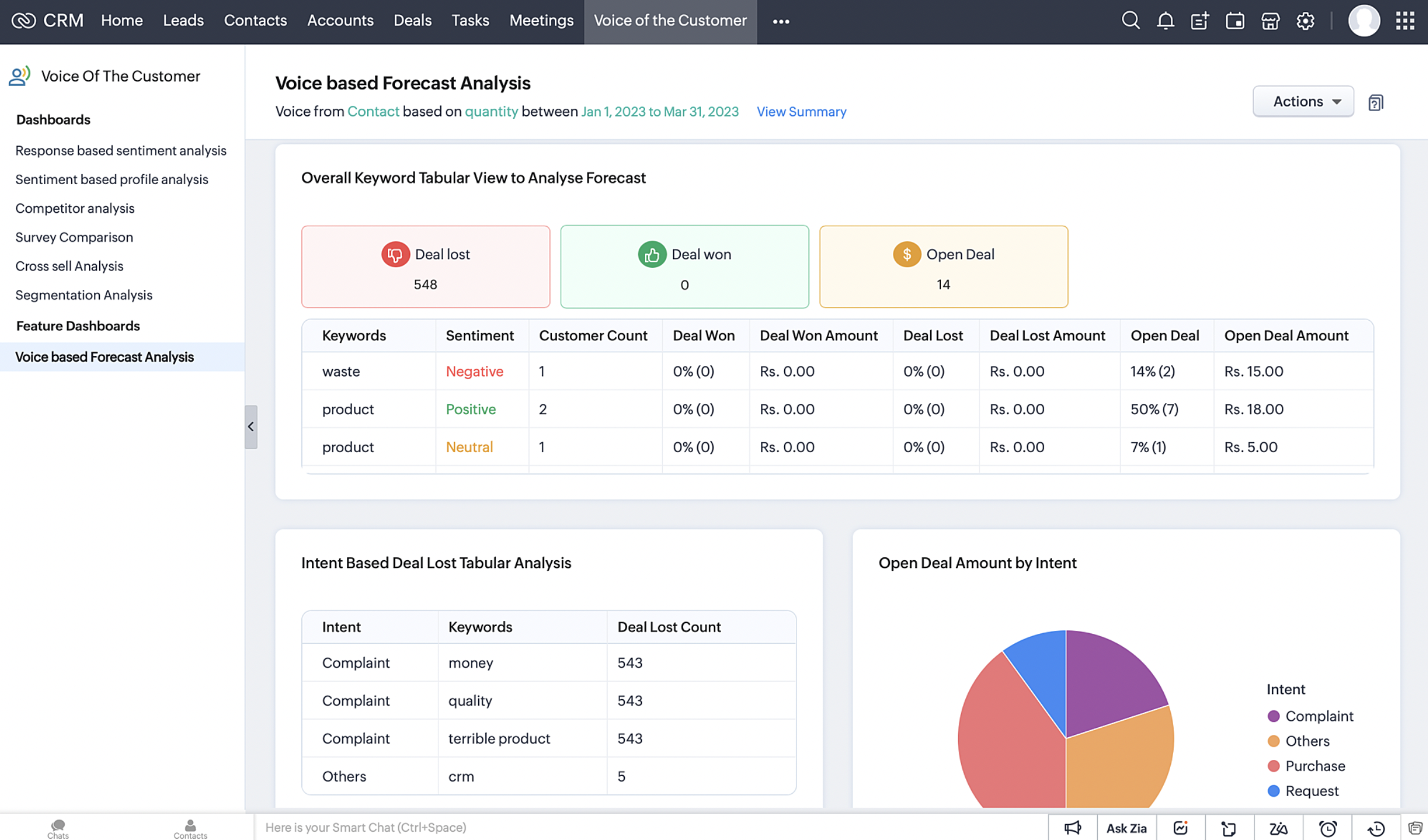
Let's say Zylker Tech uses Zoho CRM to keep a track of their sales efforts. Currently in their CRM, the Forecasts module projects a target of $10000 for sales team for the upcoming quarter.
In this context, with insights in the Voice based forecast analysis, they can observe real-time, key takeaways from customer feedback plotted in the context of forecast details.
For example, here you can see that there are three customers in the 2500-3000 deal lost category, who've mentioned the term "bad product" in some of their conversations with the organization. If a handful of customers have been lost because of their feedback that a "product is bad", this could immediately call for corrective actions from the organization as a whole, in terms of revisiting the quality of their offerings, and also reaching out to these lost customers to make remedies.
This will also help sales teams to plan future conversations with such customers to meet their targets better.
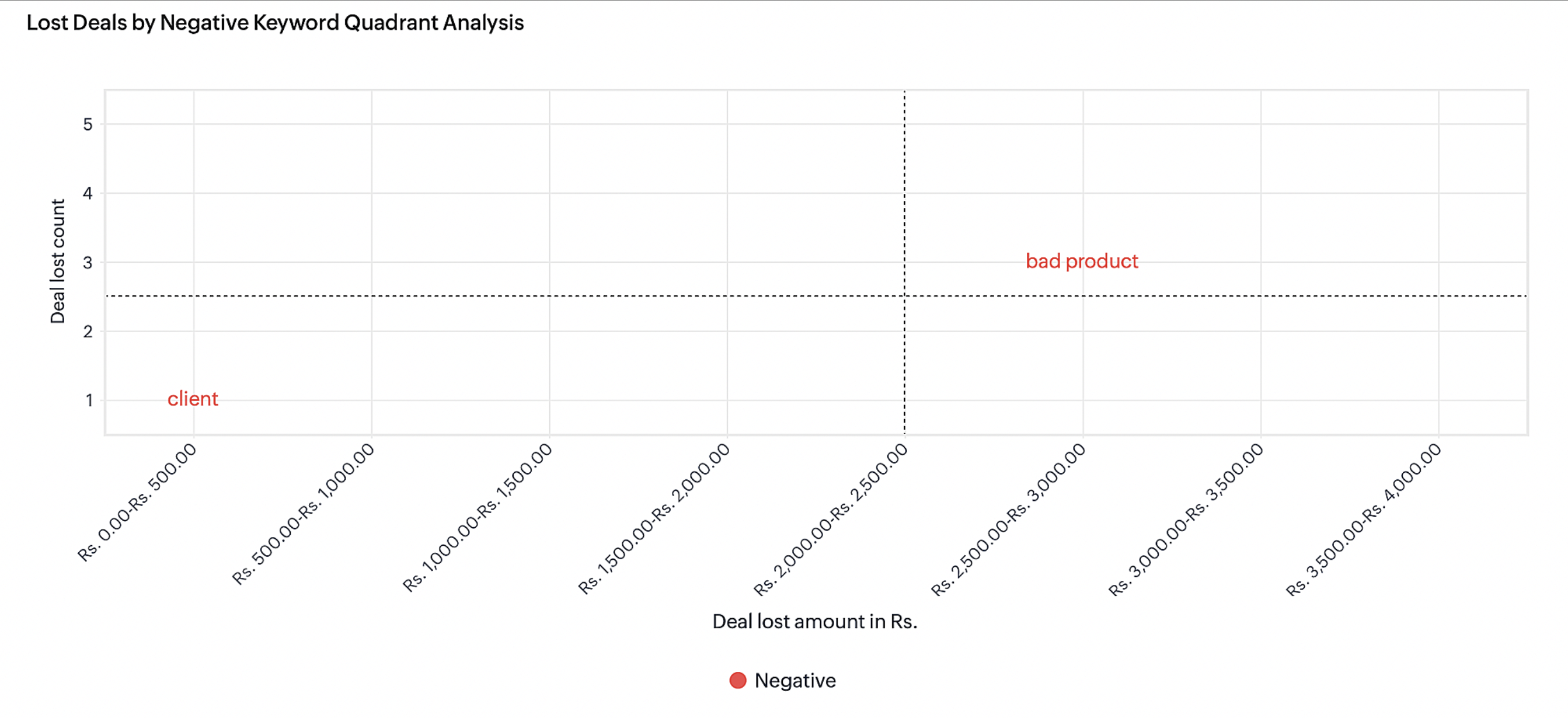
There are several more chart components in this dashboard, and they are outlined in the following sections in this post. This is just an example to indicate the value from just one particular chart. To summarize, the insights in this dashboard will help you in the following ways.
- To observe real-time feedback from customers in the context of sales forecasts, which will help you meet your sales targets better.
- To recognize a winning/losing path for deals across a projected target period and use the insights to increase the chances of successful deals within the target period.
To learn from what went wrong and apply the learning to future sales targets.
How does Voice based forecast analysis work
Zia captures all types of voice-related attributes such as keywords spoken by customers and the intent and sentiment with which the keywords were spoken. This information in conjugation with many other CRM features will give insightful dashboards for customers.
For every role in an organization, you can set a deal amount or deal revenue that needs to be delivered/achieved in a particular period (quarterly or monthly). You can see the performance trends and comparisons across periods.
For every role in an organization, you can set a deal amount or deal revenue that needs to be delivered/achieved in a particular period (quarterly or monthly). You can see the performance trends and comparisons across periods.
Key components in forecast analysis are:
Forecast type: In Zoho CRM, forecast analysis is based on the deal count (Deal Quantity) or the deal amount (Deal Revenue).
Forecast period - You can set the forecast based on Quarterly (Quarter 1, Quarter 2,.... Quarter n) or Monthly (Month 1, Month 2, Month n) period.
It is incomplete when we stop with just viewing the numbers. It turns out to be useful and important only when we question the reasoning for the gaps. It is at this juncture that VOC will help us analyze these forecast for our customers based on their constantly uttered keywords and the intent of these keywords before and after a deal win or deal loss.
It is reasoning out everything based on the Voice of the Customer. What was spoken by the customer before a deal was won or lost? How many deals were open when they were spoken?...We already have umpteen number of charts inside VOC to cater to these needs. What is new is that, CRM has now curated a certain set of charts based on forecast attributes and deliver these insights as dashboards within VOC.
How to configure voice based Forecast Analysis dashboard
To set the dashboard configuration:
- Go to Voice Of The Customer module.
- Select Voice-based Forecast Analysis dashboard from the left pane.
- Select Configure Dashboard from Actions option on the upper-right corner of the page
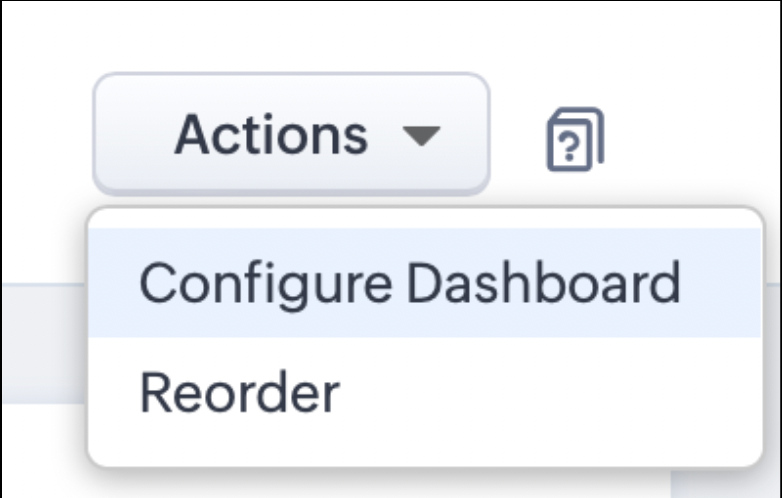
In the displayed dialog box, set the following options:
- Select Forecast - Select a forecast that you configured on the Forecast module. It is to be noted that the computations are based on forecasts for the current quarter or month only.
- Select Modules - Select the module where you want to execute forecast analysis.
- Keyword Preferences - You can choose to include all keywords or exclude certain keywords.
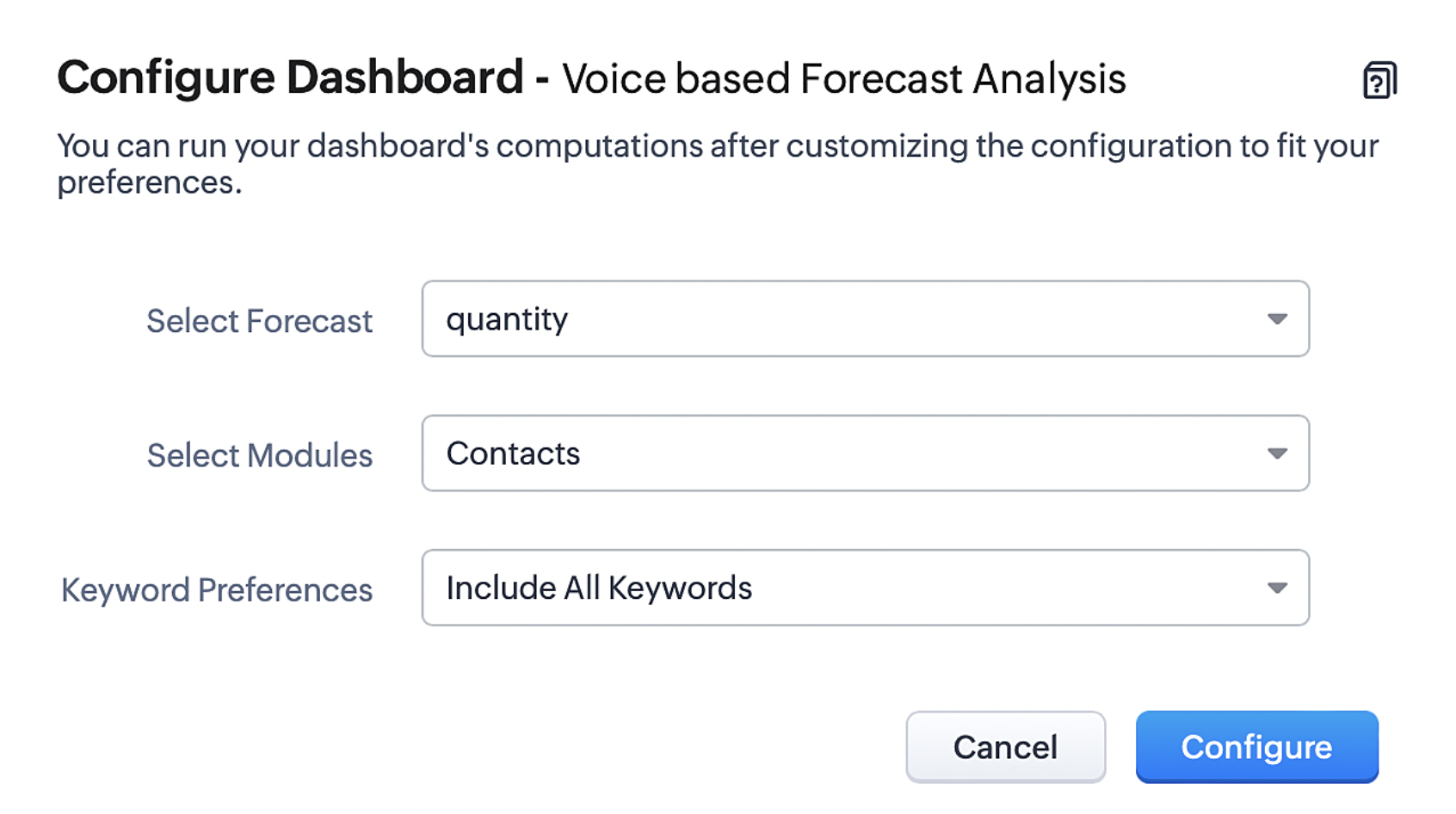
7. Click Configure to complete the configuration.
Type of Charts for Voice-based Forecast Analysis
Overall Keyword tabular view
This analysis covers details on how many deals were lost, won or open for the targeted period. The type of keyword mentioned by the customers for that month or quarter before a deal loss or deal won or any open deals. You can view the most commonly spoken keywords before every stage of a sales cycle.
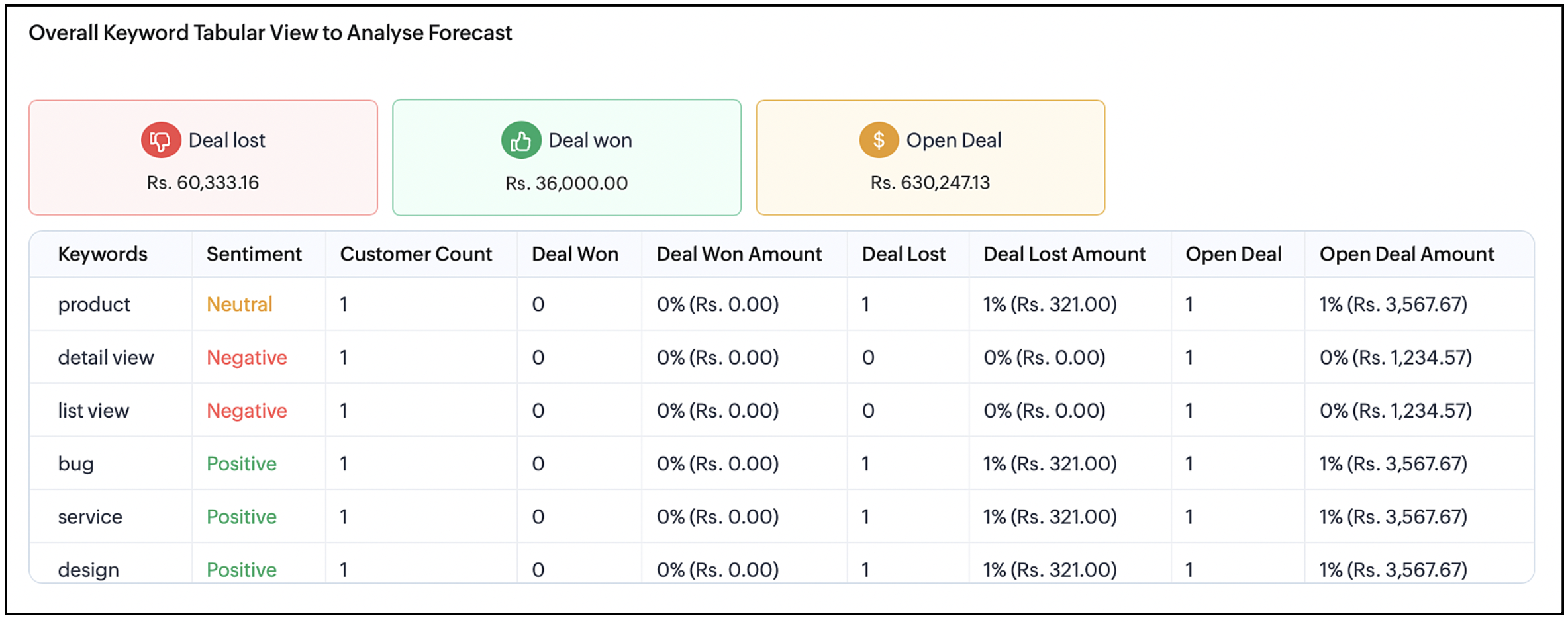
Top 5 Keyword Buzz for lost deals
Displays the deal loss percentage for every month or quarter. The number of lost deals where the top keywords were spoken over the chosen period. This will help understand the keywords that led to losing the deal and not being able to achieve the target.
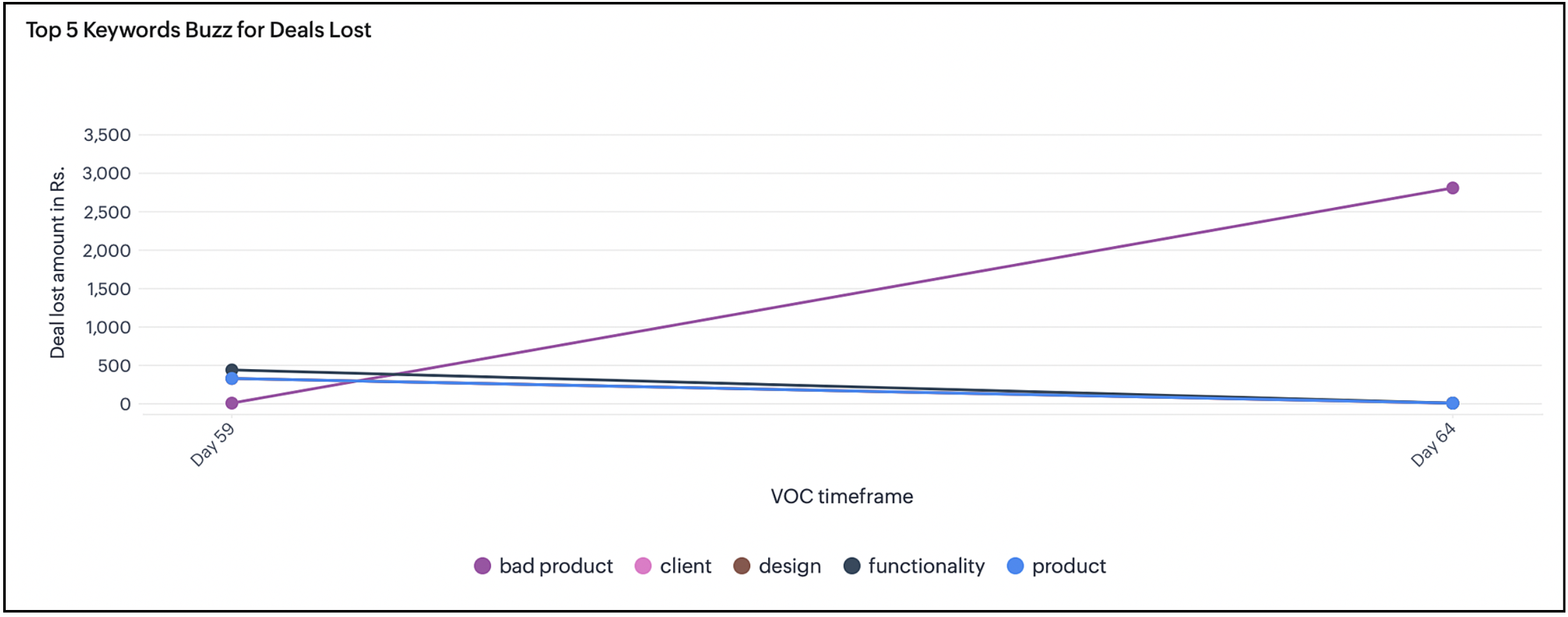
Keyword quadrant analysis for lost deals
Latest keywords with negative intent mentioned before lost deals is plotted against quadrants. This helps the user to avoid using those keywords for upcoming deals and prioritize the issues to avoid more deal loss. This helps achieve the set target for a period by analyzing the gap and avoiding such keywords that lead to deal loss.
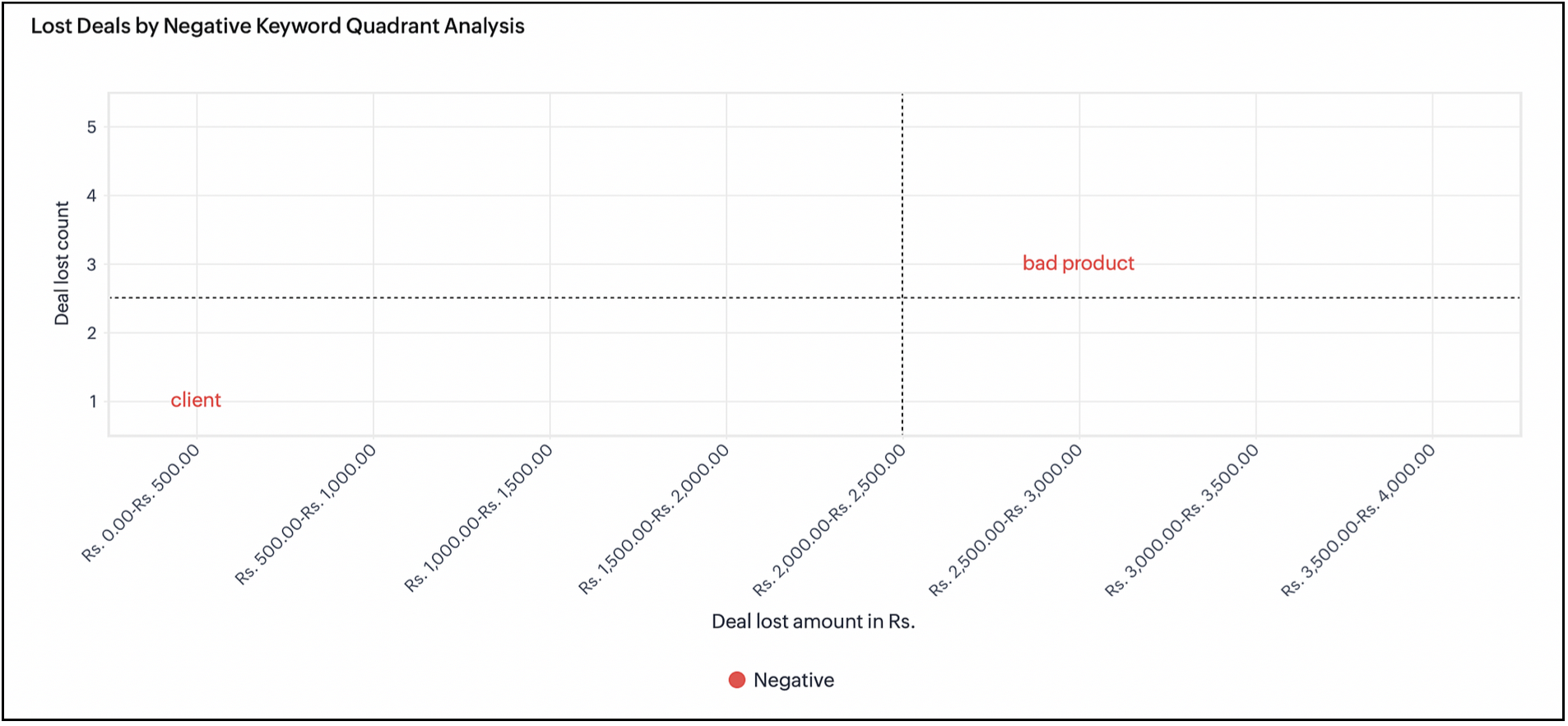
Keyword quadrant analysis for open deals
Latest keywords that were uttered during an open deal are plotted in this chart. You can compare this chart with the previous chart to find out similarities and the trajectory to lose a deal. This will help you to plan your conversations with a customer who uses keywords mentioned in the previous chart that lead to deal loss.
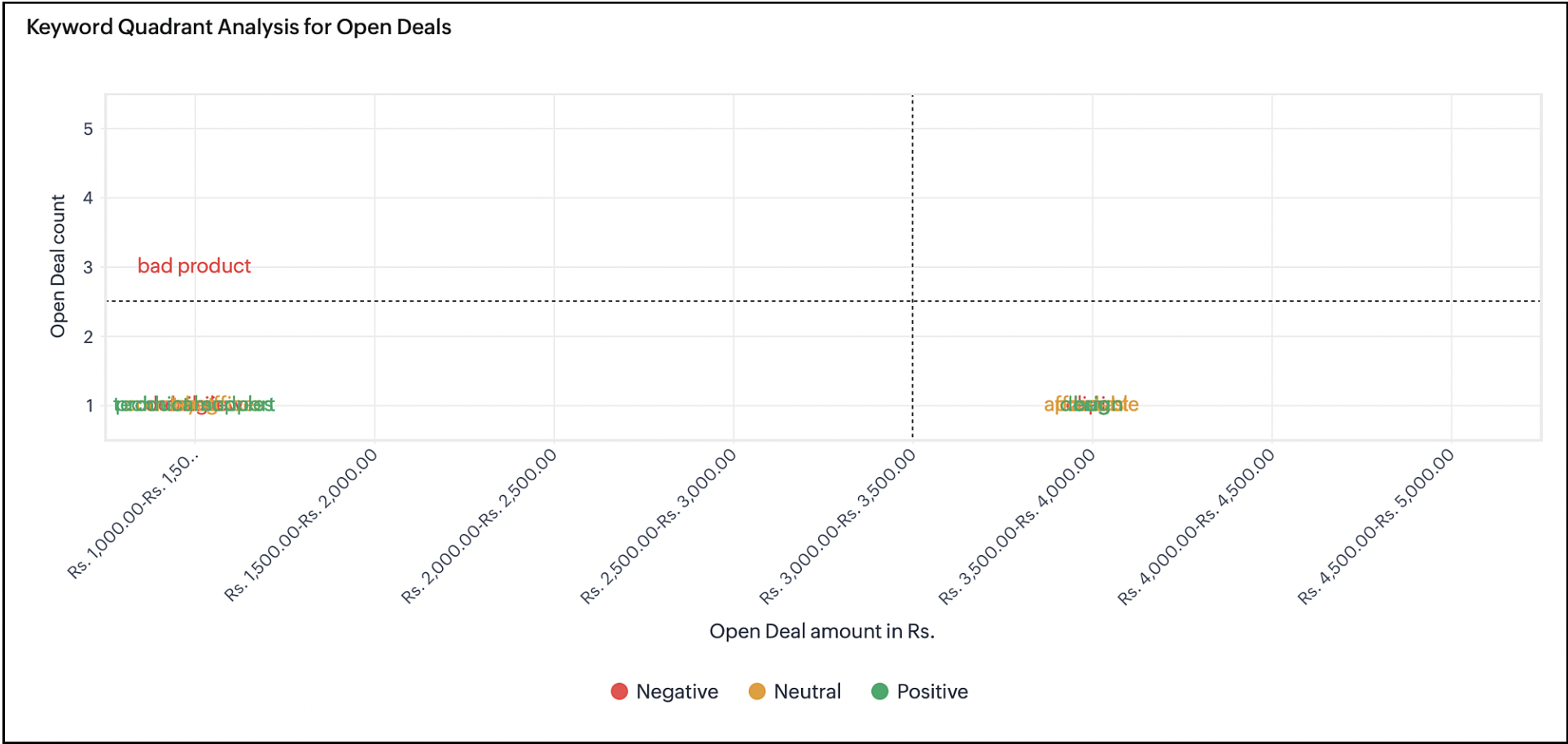
Open deal amount by intent

Deals that are open are analyzed by the intent and the keywords associated with the intent. The chart gives the user a perspective on what the state of the deal would be at the end and how it will affect the target.
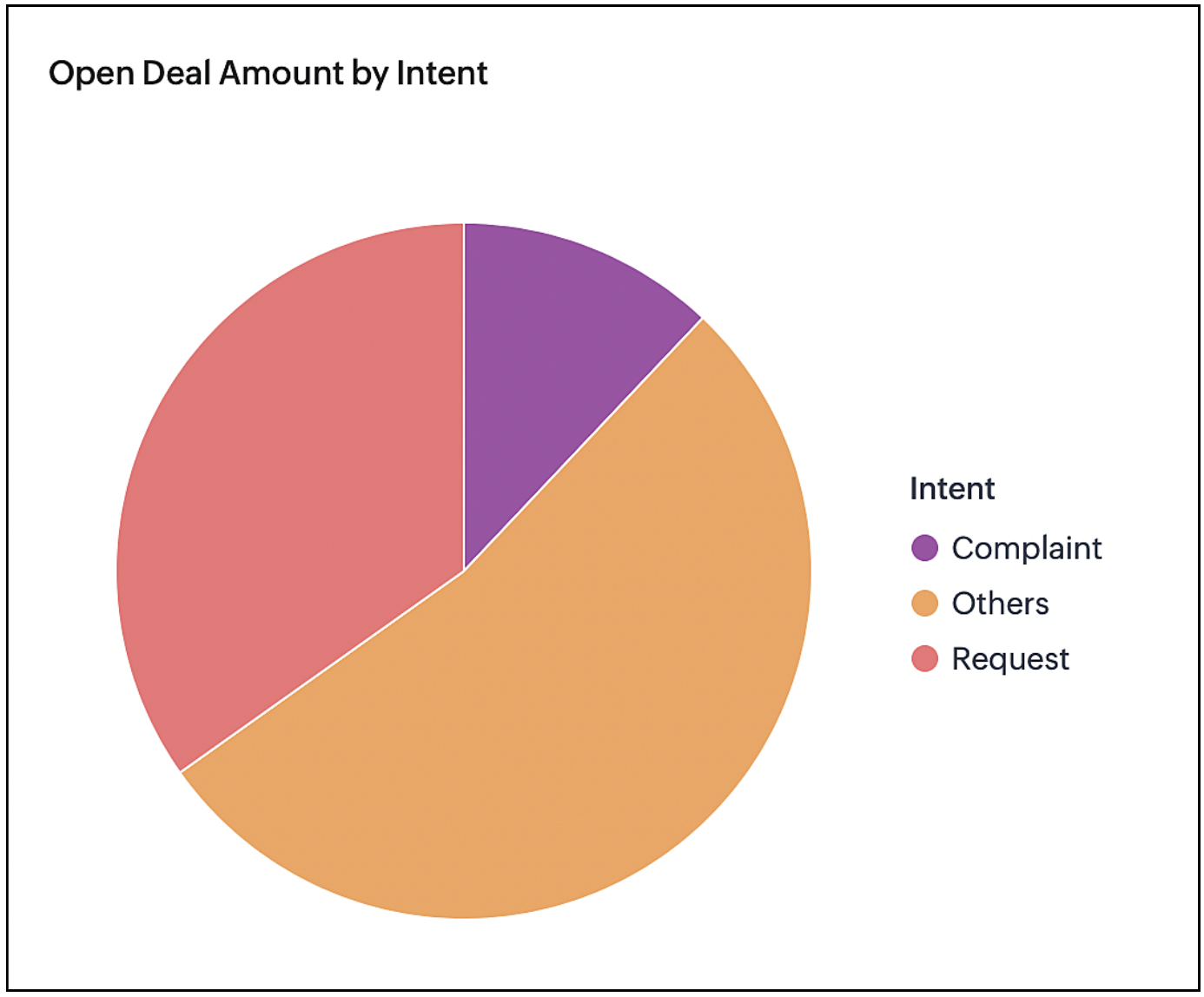
Intent-based deal lost tabular analysis
Keywords mentioned by customers are grouped based on the intent of the keywords. For example, the groups can be a complaint, request, dissatisfaction and so on. You can see the deal revenue that is lost for an intent and what keywords are associated with that intent. This is similar to the previous chart but this chart gives detailed understanding in the tabular view.
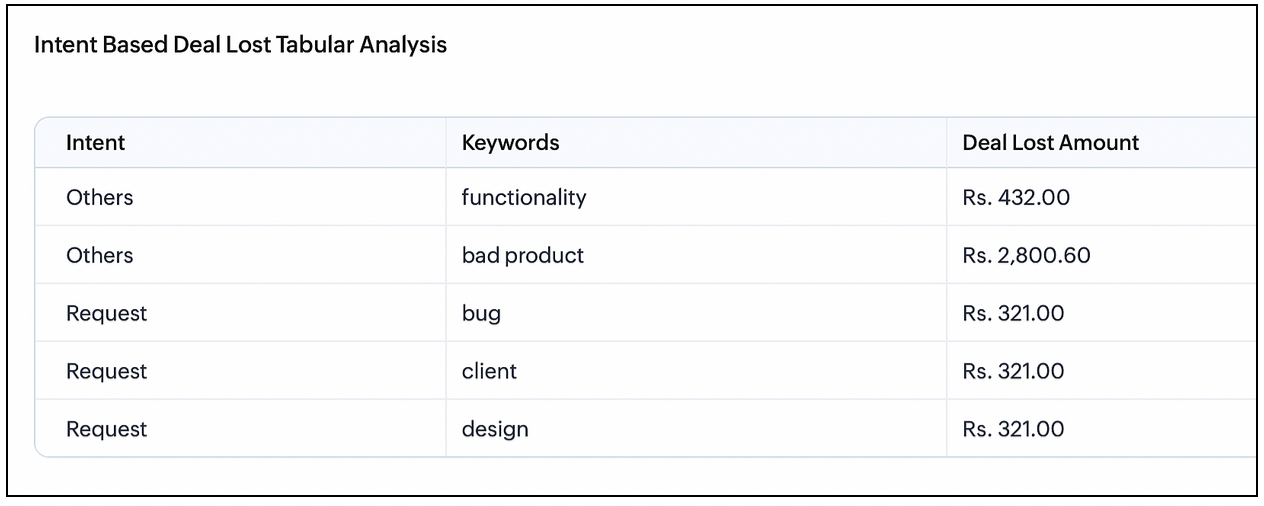
To learn more about VoC and what it offers, please refer to this guide.
That's all about this enhancement. Let us know you're feedback in the comment section.
Thank You :)
New to Zoho Recruit?
Zoho Developer Community
New to Zoho LandingPage?
Zoho LandingPage Resources
New to Bigin?
Topic Participants
Swetha S
Sticky Posts
Announcing Early Access to "Zoho CRM for Everyone" — A new and exciting update to Zoho CRM
Update : Zoho CRM For Everyone's Nextgen Interface gets an upgrade! Hello everyone, We’ve updated the Zoho CRM for Everyone Nextgen interface based on your feedback. The UI is now simpler with a unified sidebar, a more visible global search and features[Early Access] Voice of the Customer (VoC) for Zoho CRM
Happy new year, everyone! We have an exciting addition to our suite of features and would like to introduce you to VoC (Voice of the Customer) for Zoho CRM, powered by Zia. 2023 is definitely the best time to be a customer with rapid innovations and advancementsAdding calls as a channel in Voice of the Customer
Dear All, We hope you're well! It's been almost a year since we opened Zoho CRM's Voice of the Customer solution up for early access. We are grateful for the reception and support you have been showing us with regards to its adoption and feedback. Since
New to Zoho TeamInbox?
Zoho TeamInbox Resources
Zoho CRM Plus Resources
Zoho Books Resources
Zoho Subscriptions Resources
Zoho Projects Resources
Zoho Sprints Resources
Qntrl Resources
Zoho Creator Resources
Zoho CRM Resources
Zoho Show Resources
Get Started. Write Away!
Writer is a powerful online word processor, designed for collaborative work.
Zoho CRM コンテンツ
-
オンラインヘルプ
-
Webセミナー
-
機能活用動画
-
よくある質問
-
Ebook
-
-
Zoho Campaigns
- Zoho サービスのWebセミナー
その他のサービス コンテンツ
Nederlandse Hulpbronnen
ご検討中の方
Recent Topics
SMS to customers from within Bigin
Hi All, Is there anyone else crying out for Bigin SMS capability to send an SMS to customers directly from the Bigin interface? We have inbuilt telephony already with call recordings which works well. What's lacking is the ability to send and receiveZoho Survey reminder settings are extremely confusing
Hi, I just want to set 3 reminders, one week apart from the first email out. Your form is too confusing and I don't understand. Can you simplify and be more specific regarding the language used on the form ?Add deluge function to shorten URLs
Zoho Social contains a nice feature to shorten URLs using zurl.co. It would be really helpful to have similar functionality in a Deluge call please, either as an inbuilt function or a standard integration. My Creator app sends an email with a personalisedAdd specific field value to URL
Hi Everyone. I have the following code which is set to run from a subform when the user selects a value from a lookup field "Plant_Key" the URL opens a report but i want the report to be filtered on the matching field/value. so in the report there isform data load issue when saving as duplicate record is made
Hello. I have a form with a lookup when a value is selected the data from the corresponding record is filled into all of the fields in the form. But the form is loaded in such a state that if any value is changed it will take all of the values pre loadedUnable to remove the “Automatically Assigned” territory from existing records
Hello Zoho Community Team, We are currently using Territory Management in Zoho CRM and have encountered an issue with automatically assigned territories on Account records. Once any account is created the territory is assigned automatically, the AutomaticallyTrack online, in-office, and client location meetings separately with the new meeting venue option
Hello everyone! We’re excited to announce meeting enhancements in Zoho CRM that bring more clarity and structure to how meetings are categorized. You can now specify the meeting venue to clearly indicate whether a meeting is being held online, at theGoogle Fonts Integration in Pagesense Popup Editor
Hello Zoho Pagesense Team, We hope you're doing well. We’d like to submit a feature request to enhance Zoho Pagesense’s popup editor with Google Fonts support. Current Limitation: Currently, Pagesense offers a limited set of default fonts. Google FontsImproved Contact Sync flow in Google Integration with Zoho CRM
Hello Everyone, Your contact sync in Google integration just got revamped! We have redesigned the sync process to give users more control over what data flows into Google and ensure that this data flows effortlessly between Zoho CRM and Google. With thisPro Lite Upgrade - Quick Access Tray
Hello, I was going to upgrade to Pro Lite but the Quick Access Tray feature isn't available for Windows. Of the four features not available for Windows, the QAT is what I'm most interested in. Are there plans to add this feature for Windows anytime soon?Custom Fonts in Zoho CRM Template Builder
Hi, I am currently creating a new template for our quotes using the Zoho CRM template builder. However, I noticed that there is no option to add custom fonts to the template builder. It would greatly enhance the flexibility and branding capabilities ifImproved Functionality PO Bill SO Invoice
Hello, I need to enter over 100 items, it's frustrating to scroll a few item rows and wait for more to load, then scroll again. It would be nice to have buttons that scroll to the top or bottom with one click. Furthermore, these items I'm adding are VATWishes for 2026
Hello, and a happy new year 2026! Let's hope it's better for everyone. I'd like to share some thoughts on Zoho One and what could be useful in the short, medium, and long term. Some things are already there, but not applied to Zoho One. Others seem likeHow to Integrate Zoho Books with Xero (No Native Connection Available)
Hi everyone, I’m currently facing an issue with integrating Zoho Books invoices with Xero, as I’ve noticed Zoho does not provide a native integration with Xero at this time. I would like to ask: What are the common or recommended solutions for syncingHow to install Widget in inventory module
Hi, I am trying to install a app into Sales Order Module related list, however there is no button allow me to do that. May I ask how to install widget to inventory module related list?error while listing mails
I can't access email in any of my folders: Oops, an error occurred - retry produces the second error response: error while listing mails (cannot parse null string). I've signed in and out of Zoho, restarted my iMac.Unlocking New Levels: Zoho Payroll's Journey in 2025
Every year brings its own set of challenges and opportunities to rethink how payroll works across regulations and teams. In 2025, Zoho Payroll continued to evolve with one clear focus: giving businesses more flexibility, clarity, and control as they grow.Introducing Connected Records to bring business context to every aspect of your work in Zoho CRM for Everyone
Hello Everyone, We are excited to unveil phase one of a powerful enhancement to CRM for Everyone - Connected Records, available only in CRM's Nextgen UI. With CRM for Everyone, businesses can onboard all customer-facing teams onto the CRM platform toSend Supervisor Rule Emails Within Ticket Context in Zoho Desk
Dear Zoho Desk Team, I hope this message finds you well. Currently, emails sent via Supervisor Rules in Zoho Desk are sent outside of the ticket context. As a result, if a client replies to such emails, their response creates a new ticket instead of appendingCRM project association via deluge
I have created a workflow in my Zoho CRM for closing a deal. Part of this workflow leverages a deluge script to create a project for our delivery team. Creating the project works great however, after or during the project creation, I would like to associateZoho Browser??
hai guys, this sounds awkward but can v get a ZOHO BROWSER same as zoho writer, etc. where i can browse websites @ home and continue browsing the same websites @ my office, as v have the option in Firefox, once i save and close the browser and again when i open it i will be getting the same sites. If u people r not clear with my explanation, plz let me know. Thanks, SandeepWhere can we specify custom CSS in Zoho Forms custom theme ?
I'm using a form with a dark theme. The OTP popup window is unreadable, because for some reason, the OTP popup background fixes color to white, but still takes the font color specified in the custom theme. This ends up as white on white for me, renderingMCP no longer works with Claude
Anyone else notice Zoho MCP no longer works with Claude? I'm unable to turn this on in the claude chat. When I try to toggle it on, it just does nothing at all. I've tried in incognito, new browsers, etc. - nothing seems to work.Enable History Tracking for Picklist Values Not Available
When I create a custom picklist field in Deals, the "Enable History Tracking for Picklist Values" option is not available in the Edit Properties area of the picklist. When I create a picklist in any other Module, that option is available. Is there a specific reason why this isn't available for fields in the Deals Module?The reason I switched away from Zoho Notebook
My main reason for switching to Zoho was driven by three core principles: moving away from US-based products, keeping my data within India as much as possible, and supporting Indian companies. With that intent, I’ve been actively de-Googling my digitalAdd RTL and Hebrew Support for Candidate Portal (and Other Zoho Recruit Portals)
Dear Zoho Recruit Team, I hope you're doing well. We would like to request the ability to set the Candidate Portal to be Right-to-Left (RTL) and in Hebrew, similar to the existing functionality for the Career Site. Currently, when we set the Career SiteAbility to Edit YouTube Video Title, Description & Thumbnail After Publishing
Hi Zoho Social Team, How are you? We would like to request an enhancement to Zoho Social that enables users to edit YouTube video details after the video has already been published. Your team confirmed that while Zoho Social currently allows editing theFree Webinar : Unlock AI driven business insights with Zoho Inventory + Zoho Analytics
Are you tired of switching between apps and exporting data to build customized reports? Say hello to smarter & streamlined insights! Join us for this exclusive webinar where we explore the power of the Zoho Inventory–Zoho Analytics integration. LearnCritical Issue: Tickets Opened for Zoho Support via the Zoho Help Portal Were Not Processed
Hi everyone, We want to bring to your attention a serious issue we’ve experienced with the Zoho support Help Portal. For more than a week, tickets submitted directly via the Help Portal were not being handled at all. At the same time no alert was postedHide/Show Subform Fields On User Input
Hello, Are there any future updates in Hide/Show Subform Fields "On User Input"?Cloning Item With Images Or The Option With Images
Hello, when I clone an item, I expect the images to carry over to the cloned item, however this is not the case in Inventory. Please make it possible for the images to get cloned or at least can we get a pop up asking if we want to clone the images asArchiving Contacts
How do I archive a list of contacts, or individual contacts?WorkDrive and CRM not in sync
1/ There is a CRM file upload field with WorkDrive file set as the source: 2/ Then the file is renamed in WorkDrive (outside CRM): 3/ The File in CRM is not synced after the change in WorkDrive; the file name (reference) in CRM record is not updated (hereCustom validation in CRM schema
Validation rules in CRM layouts work nicely, good docs by @Kiran Karthik P https://help.zoho.com/portal/en/kb/crm/customize-crm-account/validation-rules/articles/create-validation-rules I'd prefer validating data input 'closer to the schema'Adding Default Module Image into mail merge field
As with most people finding their way to these forums i have a specific requirement that doesn't seem to be supported by Zoho I have created 2 custom modules to suit my purpose 1 is an inventory type module that lists aluminium extrusions, and all relevantSync Data from MA to CRM
Currently, it's a one-way sync of data from the CRM to MA. I believe we should have the ability to select fields to sync from MA to the CRM. The lead score is a perfect example of this. In an ideal world we would be able to impact the lead score of aIs it possible to roll up all Contact emails to the Account view?
Is there a way to track all emails associated with an Account in one single view? Currently, email history is visible when opening an individual Contact record. However, since multiple Contacts are often associated with a single Account, it would be beneficialUpdate CRM record action
Currently, MA only offers a "Push Data" action to push data to a CRM module. This action is built to cover the need to both create a new record and update an existing record. Because it has been implemented this way all required fields on the CRM moduleNotes badge as a quick action in the list view
Hello all, We are introducing the Notes badge in the list view of all modules as a quick action you can perform for each record, in addition to the existing Activity badge. With this enhancement, users will have quick visibility into the notes associatedWhat's new in Zoho One 2025
Greetings! We hope you have all had a chance by now to get hands-on with the new features and updates released as part of ZO25. Yes, we understand that you may have questions and feedback. To ensure you gain a comprehensive understanding of these updates,Next Page












